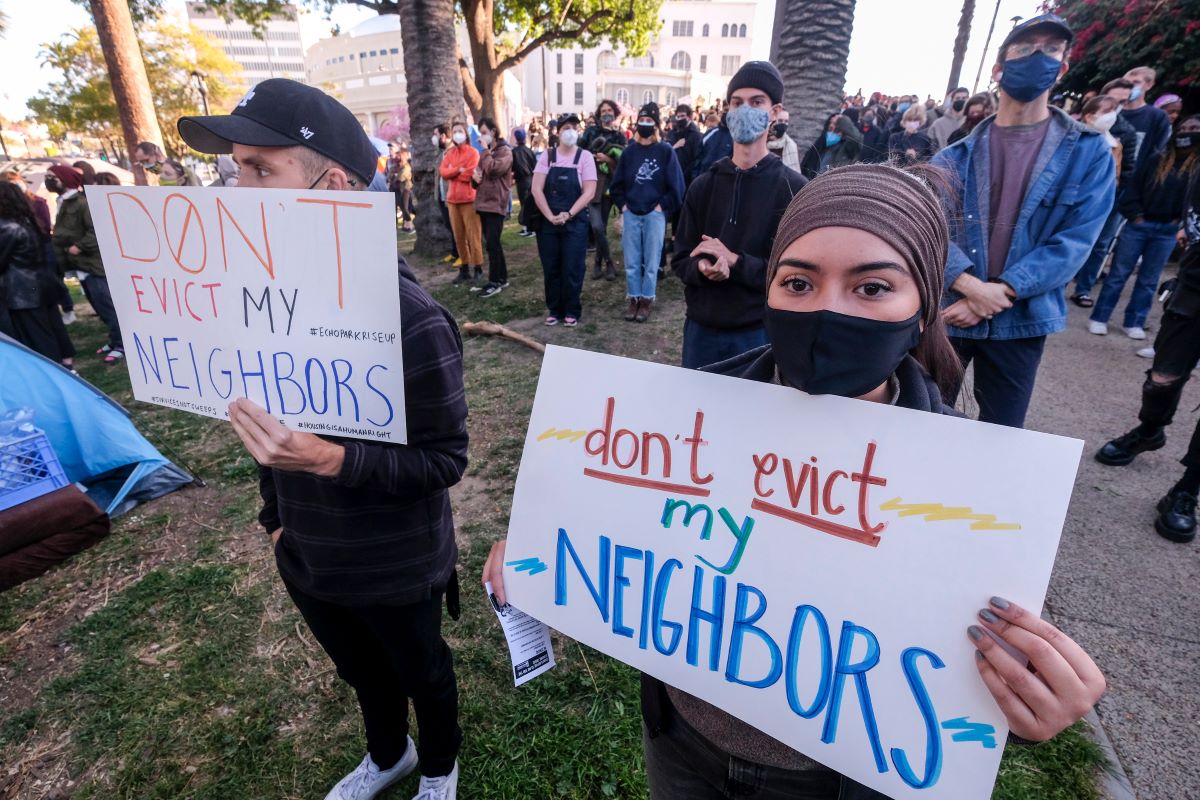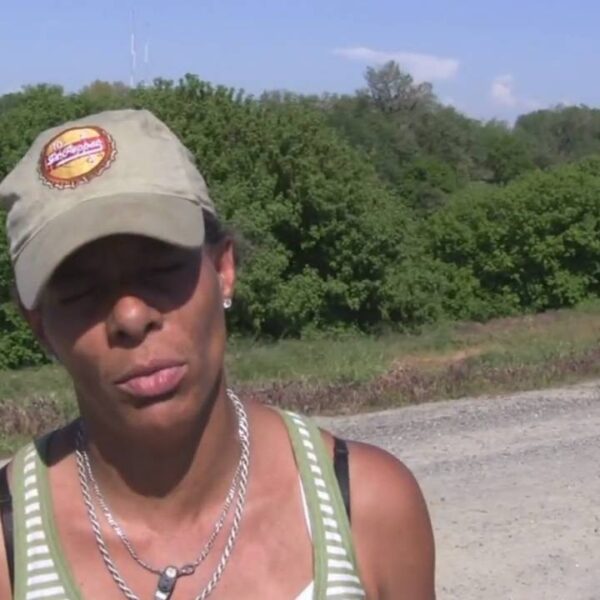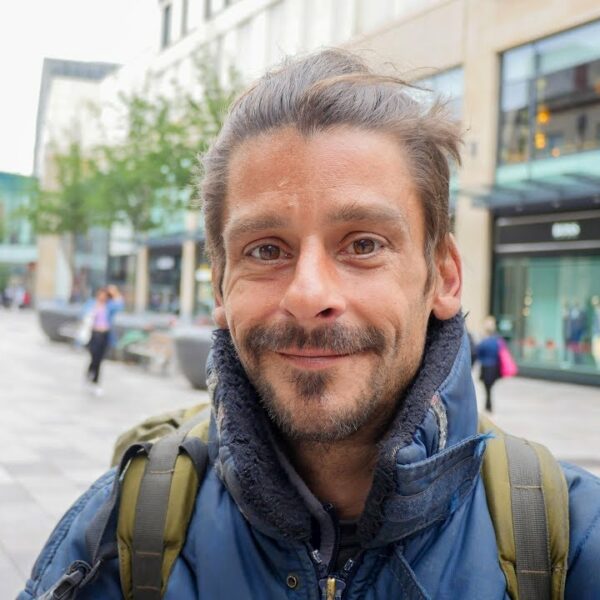Note: This post is inspired by a Twitter thread posted online by @DrSarahAxelrath, which offers an insider’s perspective on sweeps that would be difficult for people who are not doctors or firsthand witnesses to access. Please take a moment to review the original tweet and to follow this insightful advocate/medical professional for more information like this.
So much information was exposed in this short exchange that we at Invisible People found it imperative to broach this topic with our readers. It’s time we come clean with the truth about sweeps and the threat they pose to all communities, housed and unhoused.
On a bleak December day in Denver, encampment residents who had been rendered homeless and abandoned by the world, sleeping in tents and makeshift roadside shelters like social castaways, were in a deeper state of panic than usual.
Dr. Sarah Axelrath, MD, a highly experienced addiction medicine and primary care physician, joined a medical street outreach team in assessing the situation. She described her would-be patients as “frantically trying to pack up their few worldly belongings and scout a new spot to survive a few days until the next inevitable sweep”.
Today on medical street outreach we went to a camp that has been “posted” for sweeping tomorrow. Everyone was frantically trying to pack up their few worldly belongings and scout a new spot to survive a few days until the next inevitable sweep.
— Sarah Axelrath, MD (@DrSarahAxelrath) December 8, 2021
The scenario grew more precarious by the minute.
Out of fear of losing all of their precious belongings during the sweep, several encampment residents adamantly refused much needed medical assistance. One of these patients had sustained scorching second-degree burns but continued to pack instead of seeking medical help.
Another patient whose blood pressure reading indicated a medical emergency also refused to leave the encampment. This patient had already lost her medication in a previous sweep, an action that could have been the reason her health was failing in the first place. To make matters worse, several encampment residents were missing, with the threat of a pending sweep filtering the air and all of the violence that so often accompanies these forcible encampment clearings. Among the missing were:
- A pregnant woman in her third trimester
- A post-partum patient who had continued bleeding two months after giving birth
- An individual who might have had a housing opportunity on the horizon
As you can see, sweeps pose a severe threat to homeless people’s health, their livelihood, and the little freedom they have left.
Time and again, street medicine administrators, leaders, and outreach workers complain of the harms caused by these often-violent encampment clearings. Still, the general public, the very taxpayers whose money is filtered into this uniquely brutal way of penalizing poverty, are mostly left in the dark about the details.
Coming Clean with the Truth about Sweeps
Homeless encampments are not ideal living conditions, but it’s important to remember that no state of homelessness is. One thing encampments do that people in positions of power really hate is they make homelessness a visible problem. With tent cities lining sidewalks and city centers, even the staunchest NIMBYs are forced to face facts. Homelessness isn’t going anywhere. Indeed, it is increasing.
Sweeps are presented to taxpayers in the form of laws they typically don’t understand. Anti-homeless legislation can even be perceived as silly to people who are not well-versed on the subject.
For example, in Delaware, it is illegal to sleep or even pretend to sleep on a bench on the boardwalk. People who are unaware of the fact that this legislation is used to criminalize homeless people and deconstruct their encampments think the law is just plain ridiculous or perhaps outdated. In reality, there is a far more sinister reason wording like this exists on the books.
According to the National Low Income Housing Coalition’s latest report Housing Not Handcuffs 2021, which examined nationwide legislation, these types of laws exist in almost every state in the country. To be precise, 47 states plus the District of Columbia each possess at least one piece of legislation that is used to arrest, cite, relocate, or otherwise criminalize homeless people for engaging in life-sustaining actions like sleeping, standing, or walking.
So, when you see armed officers in riot gear forcibly removing people from their makeshift shelters, trashing their belongings, and destroying their lives in the process, know that these laws are what make these abhorrent actions possible. When asked, authorities repeatedly state that they are merely doing what they were hired to do: enforce the law.
In Order to Save Lives and Millions of Tax Dollars, Anti-Homeless Legislation Must be Banished
There are multiple ways in which sweeps endanger homeless people’s lives. Some of the most prominent include:
- Disposal of life-saving medication
- Disposal of documents needed to obtain life-saving medications such as prescriptions, insurance cards, and photo identification
- Fear of losing items in a sweep causing encampment residents to forego much-needed medical assistance
What are the consequences of such actions?
In the short-term, encampment residents could experience even more pain and suffering than they are already exposed to just by having no stable place to call their home. They might have to deal with a painful, aching tooth abscess or a potentially life-threatening injury such as a gaping wound or stinging burn.
Based on the testimonial above, we now know that at least one post-partum encampment resident is enduring vaginal bleeding months after delivery while several other pregnant women are not receiving the prenatal care they desperately require. In a separate but related incident exhibiting similar circumstances, a homeless woman by the name of Jessica Aldama tragically died while giving birth to a stillborn infant alone in an open field. Not every sweep-related tragedy unfolds this quickly. Long-term consequences are often even worse.
In the long run, the desolate state of homelessness and the criminalization that follows, make the average homeless person’s life expectancy 30 years younger than their housed counterparts. Indeed, due to current policy, the average homeless person will die by the age of 47. How old are you?
Urge Your Legislators to Change these Local Laws
If we have learned nothing else from the pandemic, we have most certainly learned that communal health is just as important as individual health in maintaining the social safety of our collective. Homeless people, wherever they may be, are members of your community.
This post deals only with the adverse effects that sweeps can have on health. However, it’s important to point out that in addition to deteriorating public health, such actions are also proven futile in ending or even reducing homelessness. They are also extremely expensive, costing taxpayers millions of dollars in funds that could be better spent.
Dr. Axelrath herself issued the following statement on Twitter:
“Please point me toward ONE piece of data that supports this policy. ANY positive outcome. Otherwise, I’m forced to assume that the cruelty is the point.”
As homeless researchers and advocates, we must conquer. Studies continue to show that sweeps do not exhibit positive outcomes for anyone, especially the homeless people politicians claim to be helping. It is sad to say, but from this perspective, this brutality is completely unjustified unless these acts are being carried out for the sole purpose of brutality.













